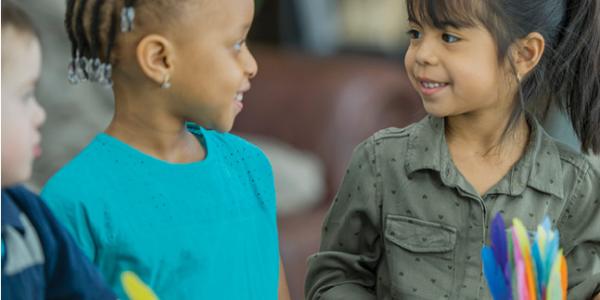Both/And: Early Childhood Education Needs Both Play and Equity

You are here
All children have a right to play. All children learn through play, not as enrichment but as a foundational context. Public outcry that play is disappearing from early childhood ignores the elephant in the room: this worrisome trend impacts young children unequally. Early education is segregated by race and class in the same way K–12 education is. Play-centered advocacy must dismantle oppressive educational systems that deny access to play based on race and class.
I will illustrate these systemic disparities with anecdotes from my own experience. As a consultant, I visit early childhood programs across the country. Over time, I noticed that access to play varies according to the racial and socioeconomic status of the children served. Access to play materials, spaces, and relationships are systemically and disproportionately denied to children who are not part of White, middle-class, able-bodied, dominant society (Strauss 2020).
I visited a program in an affluent community. Four Korean American children, two Chinese American children, one African American child, and one biracial (African American and Latina from Puerto Rico) child make up 10 percent of the students. The other 90 percent are White. English is spoken by all the children and staff. The center is funded by a mix of public and private resources.
Play-centered advocacy must dismantle oppressive educational systems that deny access to play based on race and class.
In this preschool program, there are lush outdoor environments to explore. Children can roll down a hill, climb up into a treehouse, or paint on easels covering a wall. A wire construction is in progress with wire and beads nearby. Water tables hold plastic sea animals and various containers. Indoors, children dress up to battle monsters, build a farm and a rocket ship with blocks, and play drums. I hear children laughing, talking, whispering, and crying in a teacher’s arms after a fall. I see a teacher listening and drawing as a small group of children plans to build a rolling river in the sand pit. Developmental portfolios are filled with work samples, captioned pictures, anecdotal notes, family commentary, and a developmental checklist.
In contrast, I visited a publicly funded preschool in a working-class neighborhood. The racial makeup is 50 percent Latino/a from Mexico and El Salvador and 50 percent African American. Forty percent of the children speak Spanish as their home language. Spanish and English are spoken in the classroom, but most written material is in English.
Four classrooms encircle a yard dominated by a huge play structure that was purchased through the families’ fundraising. So that all the classrooms can share the play space, outside playtime is limited to 20 minutes. Children run around the structure and tell me that sometimes their teacher brings out balls. Teachers remind children to lower their voices when they laugh loudly or yell.
Inside, each child sits on their own carpet piece and waits for about five minutes for everyone to sit with legs crossed and hands in laps. The teacher reads a book from the literacy curriculum about the letter M, and children repeat preselected M-words from cards. Next, the children go to assigned seats to trace the letter M. Then (finally) it’s indoor playtime. Children choose from puzzles, Legos, a dramatic play kitchen, and a craft project, which involves pasting together a precut monkey puppet (the letter M). The teacher’s assessment books feature each child’s picture and a printout of their check-marked assessment form.
Perhaps, we may think, the teachers in the second program are less educated; they don’t fully understand the importance of play. But teachers in both programs have at least bachelor’s degrees. Assistants have associate degrees. They all value play and learned about it through formal and informal education opportunities. So the difference is not individual; it is systemic. As Nancy Carlsson-Paige notes,
The play disparity in school begins well before kindergarten. Because we don’t provide high-quality preschool to all children in the nation, parents are on their own to try to find prekindergarten programs for their kids. Children from families with means typically attend private preschools, the vast majority of which offer play-based, experiential, activity-centered learning—the best that money can buy. But children who attend preschool programs receiving public funds get a much different kind of education. Their programs require that they learn discrete academic skills delivered through direct instruction and measured by tests. (Strauss 2020)
The unintentional consequence of more assessments and regulations in early childhood has been the lack of play and more teacher-directed activities to supposedly teach children the skills that will make them school ready and close the achievement gap (Dornfeld 2019). These educational reforms, applied to children from low-income communities, children of color, and Native American children, are restricting their access to self-initiated, complex play, which hampers their learning and healthy development. It’s time we analyze how systemic classism and racism protect play for some children while devaluing it for others.
The goal is to move play back to the center of childhood experiences for all children.
This piece is excerpted from NAEYC’s recently published book Developmentally Appropriate Practice in Early Childhood Programs Serving Children from Birth Through Age 8, Fourth Edition. For more information about the book, visit NAEYC.org/resources/pubs/books/dap-fourth-edition.
Photograph: © Getty Images
Copyright © 2022 by the National Association for the Education of Young Children. See Permissions and Reprints online at NAEYC.org/resources/permissions.
References
Dornfeld, A. 2019. “White Kids Usually Get the Most Recess in Seattle. Black Kids, the Least.” KUOW (radio station), August 26, 2019. www.kuow.org/stories/white-students-tend-to-get-the-most-recess-in-seattle-black-students-the-least
Strauss, V. 2020. “Why Schools—Now More Than Ever—Should Let Young Kids Learn Through Play (Not Worksheets).” Washington Post, September 17.
Ijumaa Jordan is an early childhood education consultant specializing in reflective practice, pedagogical leadership, and anti-bias practices in early education.